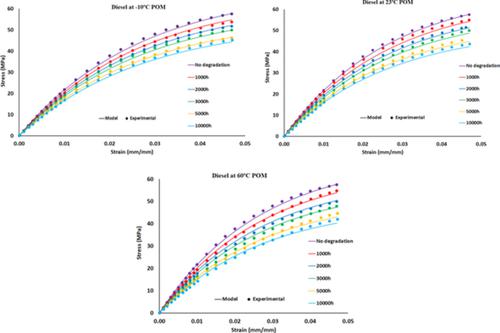当前位置:
X-MOL 学术
›
Polym. Eng. Sci.
›
论文详情
Our official English website, www.x-mol.net, welcomes your
feedback! (Note: you will need to create a separate account there.)
Long‐term effect of diesel degradation on polyoxymethylene at different temperatures
Polymer Engineering and Science ( IF 3.2 ) Pub Date : 2020-10-21 , DOI: 10.1002/pen.25566 J.M.L. Reis 1 , F.C. Amorim 2 , J.F.B. Souza 1 , T. Sant'Anna 1 , H.S. Costa Mattos 1
Polymer Engineering and Science ( IF 3.2 ) Pub Date : 2020-10-21 , DOI: 10.1002/pen.25566 J.M.L. Reis 1 , F.C. Amorim 2 , J.F.B. Souza 1 , T. Sant'Anna 1 , H.S. Costa Mattos 1
Affiliation

|
Diesel is an important fuel, partly because of the longevity and cleanliness of diesel engines. Often, polymers are in direct contact with diesel and understanding compatibility is critical. Polyoxymethylene (POM) is a thermoplastic used to manufacture automotive fuel pump gears and rotors due to its low coefficient of friction and thermal and dimensional stability. In this study, tensile tests were performed on plain and glass fiber reinforced (POM and POMGF) after immersion in diesel at different temperatures (−10°C, 23°C, and 60°C) for 1000, 2000, 3000, 5000, and 10 000 hour. A mathematical model was developed using data from just three tensile stress‐strain curves obtained at two different fluid temperatures and three different immersion times. Model and experimental results show good agreement with one another for all conditions tested.
中文翻译:

柴油在不同温度下对聚甲醛的长期影响
柴油是一种重要的燃料,部分原因是柴油发动机的使用寿命和清洁度。通常,聚合物与柴油直接接触,因此了解兼容性至关重要。聚甲醛(POM)是一种热塑性塑料,由于其低摩擦系数,热稳定性和尺寸稳定性而被用于制造汽车燃油泵齿轮和转子。在这项研究中,将普通玻璃纤维增强材料(POM和POMGF)浸入柴油中后,分别在不同温度(-10°C,23°C和60°C)下分别进行1000、2000、3000、5000,和10000小时。仅使用来自在两个不同的流体温度和三个不同的浸没时间下获得的三个拉伸应力-应变曲线的数据开发了一个数学模型。模型和实验结果在所有测试条件下均显示出良好的一致性。
更新日期:2020-10-21
中文翻译:

柴油在不同温度下对聚甲醛的长期影响
柴油是一种重要的燃料,部分原因是柴油发动机的使用寿命和清洁度。通常,聚合物与柴油直接接触,因此了解兼容性至关重要。聚甲醛(POM)是一种热塑性塑料,由于其低摩擦系数,热稳定性和尺寸稳定性而被用于制造汽车燃油泵齿轮和转子。在这项研究中,将普通玻璃纤维增强材料(POM和POMGF)浸入柴油中后,分别在不同温度(-10°C,23°C和60°C)下分别进行1000、2000、3000、5000,和10000小时。仅使用来自在两个不同的流体温度和三个不同的浸没时间下获得的三个拉伸应力-应变曲线的数据开发了一个数学模型。模型和实验结果在所有测试条件下均显示出良好的一致性。











































 京公网安备 11010802027423号
京公网安备 11010802027423号